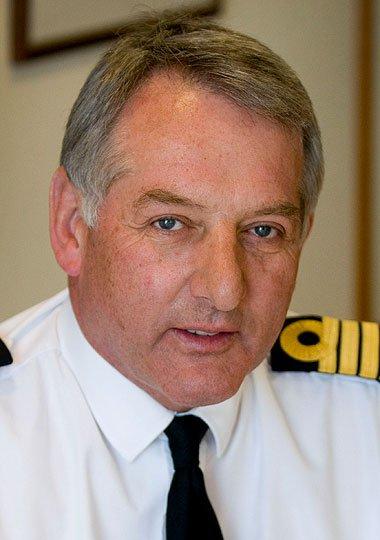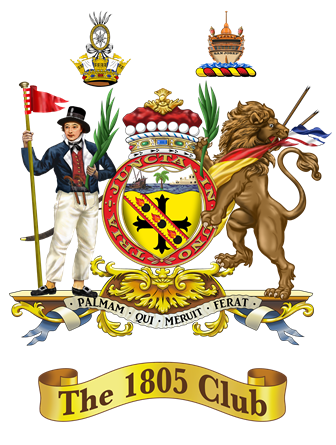The 1805 Club uses cookies to ensure you have the best possible online experience. By continuing to use this site you consent to the use of cookies in accordance with our cookie policy.
Jonathon Band joined the Royal Navy in 1967 and, having trained at BRNC Dartmouth, underwent Fleet training in ships in the Far East. Between 1981 and 1983 he served as Flag Lieutenant to Commander-in-Chief Fleet, a period which included the Falklands Campaign.

Promoted Commander in 1983, he assumed command of the frigate HMS Phoebe, followed in 1985 by attendance at the Joint Services Defence College and a subsequent appointment to the Defence Staff in the Ministry of Defence in the Directorate of Defence Policy.
Promoted Captain in 1988, he commanded HMS Norfolk and established the first Type 23 Frigate Squadron. In 1991, he became the Assistant Director Navy Plans and Programmes in the Ministry of Defence. In 1994 he was a member of the Defence Costs Study (Front Line First) Secretariat and, prior to returning to command at sea, attended the Higher Command and Staff Course. His last Sea Command was of HMS Illustrious, the aircraft carrier, between 1995 and 1997. The period included two operational deployments to the Adriatic in support of United Nations, and then NATO, operations in Bosnia.
Promoted Rear Admiral in May 1997, he returned to the Ministry of Defence as Assistant Chief of Naval Staff. He left this appointment in December 1999 and assumed the position of Team Leader of the Defence Education and Training Study in January 2000 on promotion to Vice Admiral. He became the Deputy Commander-in-Chief Fleet in May 2001 and was appointed a Knight Commander of the Most Honourable Order of the Bath in 2002. He was promoted Admiral on 2 August 2002 on becoming Commander-in-Chief Fleet and Commander Allied Maritime Component Command Northwood. This period in Command saw the Iraq Campaign, the major reorganisation of the Fleet Command and subsequent changes in NATO. He was appointed First Sea Lord and Chief of Naval Staff in February 2006 and continued in that post until July 2009.
Jonathon is Chairman of the Trustees of the recently formed National Museum of the Royal Navy. He is also President of the Royal Navy Volunteer Band Association, the Royal Navy Rugby Union and the Royal Naval and Royal Albert Yacht Club, as well as a Younger Brother of Trinity House. Jonathon is also patron of the Southsea Association and of the International Scott Centenary Expedition 2012, which commemorated the 100th anniversary of Scott's race to the South Pole. He was awarded an honorary degree of Law from Portsmouth University in 2007.
We are delighted that Admiral Band has honoured The 1805 Club by becoming its President and welcome his message.
A message from the PRESIDENT
When one completes one’s active service in the forces one is normally unclear how much contact one will want, have or indeed need with your service. Certainly, as a former head of the Royal Navy I knew and indeed expected to remain engaged but the question was to what extent.
I was always hoping to become Chairman of the Royal Naval Museum, living in Southsea as I do and having been a friend of the museum for years. But, as some of you know, the navy board, of which I was a member, decided that the service’s approach to its heritage was far too fragmented and needed to raise its game. The decision to create the national museum of the Royal Navy was made in 2007, it set up in 2009 and I became its Chairman in 2010.
It has been a busy period as the museum completed the legal integration of the service museums and the Royal Naval Museum, gave the final green light to the alliance restoration project at the Submarine Museum, progressed the preparation phase of the 20th/21st century gallery project in Portsmouth and set about assessing how we might save the former HMS Caroline, the only remaining WW1 vintage ship in the world. Meanwhile a whole raft of other initiatives is underway in the historic dockyard, at the various museum sites and nationally as we expand our affiliates programme.
I mention all this about the NMRN because we in The 1805 Club should be duly supportive of this campaign to promote naval heritage in the round. It benefits us and indeed underpins our vital work with respect to the Georgian navy. Collectively all of us in the naval family, as we take our individual agendas forward, should be aware of what others are doing. This way we can support each other and ensure that the effectiveness of the whole campaign to promote and salute naval heritage is more than the sum of its parts.
To dwell on our part of this campaign, I must say I am really encouraged by the effort made and the effect being achieved. It is always potentially divisive to highlight certain activities and not others but some in my mind are of particular note. The celebration of Collingwood in 2010 was one of them. It was well executed, provided profile in the north of England and highlighted someone who is often hidden by the glare of Nelson but was the ultimate servant to our navy and nation. To stay afloat and not return to UK between Trafalgar and his death is a remarkable testament.
The continuing programme to promote and repair the memorial and graves of the captains of the period again offers opportunity for visibility and promotion around the country. This is so important because we need to encourage membership, raise awareness and, dare I say it, money. Our growing international links, encouragement of writing and understanding and support for education impress me. The latter is particularly important because we need to sow the naval understanding seed early. Our history is the stuff of blood and gore, heroes and strategic importance. It is exciting and needs to be got out into the schools through a programme of workshops and interaction.
So there is much to do and much to be proud of and the important thing is to enjoy each others company and have fun as we move forward – that is why we are called a club.
The Chairman's Dispatch
Regular updates from The 1805 Club’s Chairman. See the archive.
Admiral Lord Nelson
Visit Admiral Lord Nelson's own blog www.admiralnelson.org.
New Links




